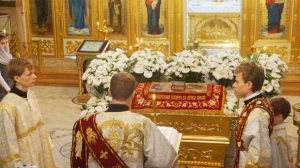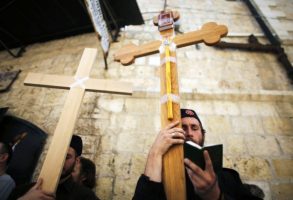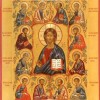In olden times the last three days of Holy Week were called ‘Cross Easter’. Even now these days stand out from all the other days of the year; they are different both from the other days of Lent and from the preceding days in Holy Week. Great Thursday, Great Friday and Great Saturday are devoted to the prayerful calling to mind and heartfelt experience of the events which occurred 2,000 years ago, the sufferings of the Savior of the world, our Lord Jesus Christ. The betrayal of Judas, the washing of the disciples’ feet, the Lord’s Supper, the arrest in the garden of Gethsemane, the trials of the high priest and of Pilate, the mocking and the condemnation to death, the carrying of the Cross, the Crucifixion, the death on the Cross, the burial, the most gracious silence at the sealing of the Holy Sepulcher in the hope of the resurrection. The whole of Lent has led us here, to the threshold of the Sepulcher, where the Word fell silent for three days…

Fr. Igor Pchelintsev
Such a sacred calling to mind for Orthodox Christians does not only mean the memory of these or other events. This is not what in other contexts would be called a ‘memory rush’. In reading prayers, accompanied by sorrowful but fitting hymns and Gospel readings, these or other images may come to mind. As regards Holy Week, inner visual imagery is greatly helped both by iconography and other more contemporary media, such as Mel Gibson’s film “The Passion of the Christ”. In a way this is good, even in part, similar spiritual exercises help the mind to rid itself of unnecessary worldly cares, thoughts about futile affairs as well as important and indeed very important matters which we should busy ourselves with, but whose meaning retreats and melts away as we draw near to the final frontier of death – the death of the Lord Jesus.
To my mind it is very important for Christians to understand such a calling to mind as the restoration through the Holy Spirit of the real memory of the truth. It is not only a matter of accepting the testimony of the Church that this and that really happened, precisely as described in the Gospel, but of restoring the holy purity of memory as a co-operation with God – in the past, the present and the future. This purity depends directly on repentance, on how much we have endeavored to purify our outward and inward view of things during Lent, on seeing everything with meekness of heart, as Christ did, with His help and strengthened by the spirit of the Gospel. During this ‘Cross Easter’ such a sacred calling to mind is for us an attempt to look at the world and human-beings through the eyes of Christ, Who carries the Cross, that is, through the eyes of Christ Crucified. And if we are able to restore in ourselves this sacred state of inner memory about life and death, about truth and judgment, then when the feast of Christ’s resurrection comes, we will be able to look at the world and human-beings precisely through the eyes (or the heart) of the Risen Savior. This may sound too bold for some, but we have no other solution. Otherwise how can we be called Christians, if our hearts are not like Christ’s and our eyes see the world differently from the Savior Himself?
The sufferings of the Savior are a medicine that heals human souls. We often think that our own misfortunes and sorrows are the most dreadful misfortunes of all and, in part, this is right. All too often contemporary man remains alone, isolated in his tragedies and sorrows and, as we know, the evil face of the devil hides behind the bleak mask of despair, squeezing the heart of the despondent in his ruthless claws. And everyone has his own misfortune like an “unrighteous mammon”…
There is one astonishing example which inspires me particularly deeply whenever I have sorrow in my heart. In 1905 the Great Duchess Elisaveta Feodorovna prayed over the remains of her husband who had been blown to pieces by red terrorists. On the very first day she received a telegram from St Petersburg from Fr John of Kronstadt, who more or less wrote the following: “Your sorrow at your husband’s death is immeasurable, the sorrow of the Mother of God at the Savior’s Cross is boundless, add these two sorrows together, those of the Mother of God and your own, and you will receive great consolation…”
There is joy in this. Do we not have the right to rejoice in Holy Week? This depends on what kind of joy we are talking about – everyday fun and superficial joking are simply too provocative for the Christian conscience, there is another time for such fun outside the days of Holy Week. But in living through these holy days together with the Church, immersing our minds in the historic background of the God-man of the Gospel, we have to confess that we are in a more advantageous, more joyful position than the holy apostles, the myrrh-bearing women and even the scribes and pharisees. They did not know what we know and what we breathe – the scribes and pharisees did their utmost to kill the Lord, Judas in his own way strove to succeed in betrayal, the apostles were struck by fear and ignorance, the holy women tried to save themselves in hope and faithfulness, and this at the frontier of death. Some of them believed that with the Savior’s death, His cause was over. The faith of others was weak to the point of deathly melancholy and sorrow.
But we are beyond this last frontier – we know about the resurrection and victory over death, we know that the pharisees’ hopes were defeated, we can derive unending creative strength for ourselves in the Resurrection – thanks be to our God who resurrects the souls of those whose conscience was consumed by fire, as we more or less sung in the famous akathist “Glory to God for All Things”. We have the opportunity to live the Gospel not as a set of instructions (“do it this way and not that way, eat this, but do not eat that”) but as the Book of Life, which determines our deeds and words, our relationship with people and the world. If we draw a parallel with school, for Christians the last days of Holy Week should become a school where the Holy Spirit is the teacher, and with Him we have the opportunity to learn the love of Christ.
During these days, the Lord abundantly sows the seed of His word in our minds and all we can do is beseech sensitivity and contrition for our souls, so that we do not ascribe to ourselves the grace-filled transfiguration of our souls – that would be the path of temptation – but to let Christ Himself act in us with love.
The Parable of the Seeds of God
A woman once had a dream in which she went into a shop and saw the Lord God standing behind the counter.
“Lord, it’s you!” she exclaimed with joy
“Yes, it’s Me”, answered God.
“But what can I buy from you?” asked the woman.
“You can buy everything from me”, came the answer.
“Then please give me health, happiness, love, success, and lots of money”.
God smiled kindly and went into the back room for the goods she had ordered. After a while He returned with a small paper box.
“Is that it?” exclaimed the disappointed woman in amazement.
“Yes, that’s it”, answered God, adding: “Surely you knew that I only sell seeds in my shop?”
Translated from Russian by Kira Stebunova
Edited by Fr. Andrew Phillips



















